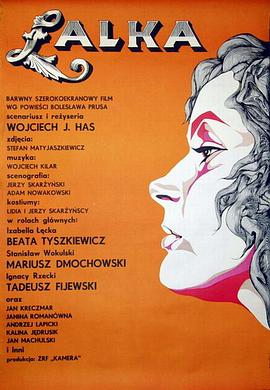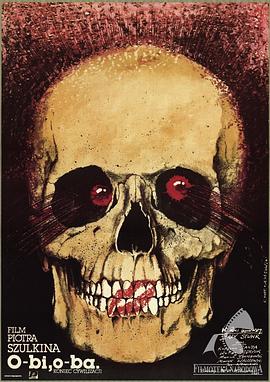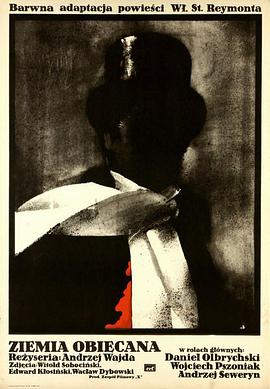主演的影片
1968
电影
/
剧情片
其它
Aleksander
Andrzej
Anna
Dewoyno
Fogiel
Gall
H
Halina
Irena
Jadwiga
Jan
Janina
Koecher
Kwiatkowska
Pieracki
Romanówna
Seniuk
Szramowska
Wladyslaw
克雷斯蒂娜.费尔德曼
卡里娜·谢鲁斯克
卢德维克·伯努瓦
塔德乌什·孔德拉特
安杰伊·瓦皮茨基
扬·克雷奇马尔
扬·马休斯基
维斯拉夫·格拉斯
菲耶夫斯基·塔德乌什
贝娅塔·蒂希基维茨
马里乌什·德莫霍夫斯基
The Doll is an adaptation of the novel, The Doll (novel) by Bolesław Prus, which is regarded by many as one of the finest Polish novels ever written and, along with Pharaoh (novel), made Bolesław Prus a potential candidate for the Nobel Prize in literature. The influence of Émile Zola is evident, and some have compared the novel to Madame Bovary by Gustave Flaubert; both were Prus's contemporaries. The movie, however, may be more compared to Stendhal's Le Rouge et le Noir, (The Red and the Black). The Doll constitutes a panorama of life in Warsaw between 1878 and 1879, and at the same time is a subtle story of three generations of Polish idealists, their psychological complications, their involvement in the history of the nineteenth century, social dramas, moral problems and the experience of tragic existence. At the same time this story describes the disintegration of social relationships and the growing separation of a society whose aristocratic elite spreads the models of vanity and idleness. In the bad air of a backward country, anti-Semitic ideas are born, valuable individuals meet obstacles on their way, and scoundrels are successful. This poetic love story follows a nouveau riche merchant, Stanislaw Wokulski, through a series of trials and tribulations occasioned by his obsessive passion for an aristocratic beauty, Izabela Lecka, played by the famous Polish actress, Beata Tyszkiewicz. Plot As a descendant of an impoverished Polish noble family, young Wokulski is forced to work as a waiter at Hopfer's, a Warsaw restaurant, while dreaming of a life in science. After taking part in the failed 1863 Uprising against Tsarist Russia, he is sentenced to exile in Siberia. On eventual return to Warsaw, he becomes a salesman at Mincel's haberdashery. Marrying the late owner's widow (who eventually dies), he comes into money and uses it to set up a partnership with a Russian merchant he had met while in exile. The two merchants go to Bulgaria during the Russo-Turkish War of 1877-78, and Wokulski makes a fortune supplying the Russian Army. The enterprising Wokulski now proves a romantic at heart, falling in love with Izabela, daughter of the vacuous, bankrupt aristocrat, Tomasz Łęcki. In his quest to win Izabela, Wokulski begins frequenting theatres and aristocratic salons; and to help her financially distressed father, founds a company and sets the aristocrats up as shareholders in his business.The indolence of these aristocrats, who secure with their pensions, are too lazy to undertake new business risks, frustrates Wokulski. His ability to make money is respected but his lack of family and social rank is condescended to. Because of his help (in secret) to Izabela's impecunious but influential father, the girl becomes aware of his affection. In the end she consents to accept him, but without true devotion or love.(wikipedia)
已完结
1985
电影
/
科幻片
其它
Set in an underground dungeon inhabited by bundled, ragged human beings, after the nuclear holocaust. The story follows the wanderings of a hero through the situations of survival. People wait for the Ark to arrive and rescue them while their habitat falls apart. Delving deep into the dusty and long abandonded vaults of b-cinema in search of lost gems always leaves me with a bittersweet taste. On one hand the discovery of unexpected gems where no one would think them possible is a rewarding experience. On the other hand though it makes one wonder how many of these remarkable low-budget oddities, personal love affairs of directors never quite famous and now all but forgotten, have almost forever slipped from memory n any case what we have here is a little post-apocalyptic gem from Poland that is really better than it has any right to. The dystopian near future of O-BI, O-BA finds a group of survivors of the nuclear war that ravaged the Earth inhabiting an underworld concrete bunker and biding their time as they wait for the mysterious Ark, an air ship of some kind that will come and save them. The Ark proves to be an elaborate hoax, carefully designed to give hope to the malnourished and desperate denizens of the bunker, while in the meantime the dome that separates their miserable existence from the nuclear winter outside is slowly caving in. What first striked me about the movie is the design of the bunker and the depiction of the survivors. The survivors are gaunt, filthy and terrible-looking penitents, dressed in rags and aimlessly wandering the neon-lit halls of the bunker like automatons. The bunker is a rundown, seedy place, with bright neon lights peering from all sides like the eyes of malignant beasts. On one hand it is a slightly 80's depiction of the dystopian future but the movie never stoops down to MAD MAX cheese. Instead it combines biting political satire with the bleak outlook of a world with no future, black comedy with barbs on apathy, religion and power. The survivors, for example, are fed some kind of flour dropping from a tube that hovers in the air - later on we discover the food supervisor uses books and the Bible itself as filler for this meagre meal. There are many such short symbolic touches, perhaps not life-changing or faith-restoring, yet playful, clever and inspired. One thing is for sure; O-BI, O-BA is not your run-of-the-mill sci-fi schlock. It overcomes its modest budget with creativity and has genuine artistic aspirations both from a writing and directing perspective. My opinion is that it should have been filmed in black and white instead of colour though. The director uses atmospheric light and shadow to great effect and it would have registered even better in stark black and white. The blue-green neon on the other hand outstays its welcome after a while. Just a minor gripe in an otherwise solid b-movie with its heart set in all the right places. Imagine a less bleak THE ROAD (Cormac McCarthy) being injected with the satire and humour of DR.STRANGELOVE and you're getting there. See it if you can find it.
已完结
1975
电影
/
剧情片
其它
Danuta Wodynska
Jadwiga Andrzejewska
卡里娜·谢鲁斯克
卡齐米日·奥帕林斯基
塔德乌什·贝亚洛诚辛斯基
安娜·内赫雷贝茨卡
安德烈·沙拉夫斯基
安德烈·瑟韦林
弗朗齐歇克·皮耶奇卡
斯坦尼斯瓦夫·伊加尔
沃捷希奇·帕斯佐尼亚克
波泽纳·里基尔
耶日·诺瓦克
达尼尔·奥勒布里斯基
马瑞安·格林卡
讲述卡罗尔、莫里斯和马科斯三个好朋友办工厂梦的过程,真实冷静的展示了波兰资本主义初期残酷的社会画卷。
已完结
1991
电影
/
电影解说
法国 波兰 挪威
两个少女,一个生在波兰,一个生在法国,同样的相貌,同样的年龄,她们也有一样的名字:薇罗尼卡。她们都那样喜欢音乐,嗓音甜美。波兰的薇罗尼卡非常喜欢唱歌,唱高音特别出众。她觉得自己并不是独自一人生活在这个世界上,没想到一天她真的遇到一个样子跟她一模一样的女孩,可是她自己却在一次表演中心脏病发暴毙在舞台上。此时身在法国的薇罗尼卡正沉醉在与男友的欢愉中,突然她觉得特别的空虚难过。此后她的生活中便常常响起一段极其哀怨的曲子,她爱上了一个儿童读物作家。一次与男友聊天的过程中,她发现了在波兰拍的照片中,出现了一个与自己极为相似的女子,此时她才深深相信,世界上还有另外一个自己存在。
电影解说





![两生花 La Double vie de Véronique[电影解说]](/data/images/video/aedd629feb16f767cb1ef08143c1484f_DWD.jpeg)